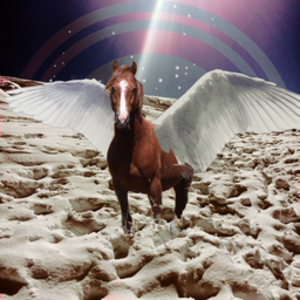That morning, when Peter was still abroad and the island therefore relatively peaceful, the mysterious currents that wend their way into Neverland brought with them a strange piece of flotsam.
Hook’s lookout called the news down the length of the ship—
“Castaway!”
A longboat was duly dispatched to bring in the unfortunate. When the pirates reached their target, they hauled him unceremoniously into the boat.
“Oh, don’t neglect my belongings, gentlemen! I beseech you!” cried the skinny man in tones of deep distress.
“Shuddup you,” snarled Bill Jukes, shoving the man down with the point of a scimitar.
Despite their naturally contrary inclinations, there was such a scarcity of items upon Neverland that every part of the makeshift raft was brought in for examination.
Hook, resplendent in his velvet coat, stared down at the miserable specimen of humanity that was cast to its knees before him on the quarterdeck.
“And what be your name, bully?” Hook asked, blowing smoke out through his nostrils languorously.
“Well,” said the slender man, climbing to his feet nimbly, before Bill Jukes could force him down again, “I am Professor Basil Rathbone, shipwrecked philosopher, and let me say that I am deeply delighted to meet with human company again! You would not be that gentleman generally known as James Hook, would you?”
“Captain James Hook,” responded that person, his face darkening. “How, Professor, do you know who I am?”
“You have the most amazing blue eyes,” said Rathbone with frank admiration, “it must be a dominant gene in your family, for I’ve never seen it before.”
Against his will, Hook found himself intrigued, and carefully examined the figure, bronzed by the sun, the muscles lean and corded like a long distance runner. Professor Rathbone was a man of older middle years, his hair long and braided neatly behind him. His ragged garb and deep tan were a far cry from the imperious, be-robed figures that Hook associated with university alumni, but he bore himself with both dignity and vivacity.
Oddities of appearance aside, he was explaining himself neither quickly nor clearly enough for satisfaction. “Speak simply!”
Professor Basil Rathbone cleared his throat a little. “You yourself may not be aware of this, but there is a lady adrift out beyond the reaches of this isle. I am afraid that she declined to give me any other name than that of Niamh, but she must be a relation of some sort. You both have the same underlying structure in the face and hair, and the colour of your eyes is unique. It would be statistically unlikely if you were not related. Correct me if this deduction is incorrect.”
This declaration fairly electrified Hook, so that his afore-mentioned eyes seemed to blaze like two comets.
“Bring him to my quarters,” snapped Hook, and turned to stride thence himself. Two bulky pirates at once seized the castaway.
“I am quite capable of bearing myself whither you may ask me to go,” said Professor Basil Rathbone with quiet dignity.
Hook paused for an instant, then acknowledged his own rudeness with a brief nod. “Very well. This way, Professor.”
From amidst the crowd of gawking pirates, Smee glared, and rubbed his bulbous nose with back of one hand. He did not like anyone who might draw the Cap’n’s attention away from Smee, who himself fawned over the man when allowed. Hook’s every word and gesture were subjects of open admiration for Smee, who had once wished to be feared as cruel and vicious, but who was now content to worship in the shadow of such a man.
Conversely, this meant that anyone who might sway Hook’s actions towards kindness, manners, mercy or any other such weaknesses, was a threat, whom Smee must eliminate.
Within Hook’s chambers, Professor Basil Rathbone stopped and stared about him, suddenly paling, and seeming to sway in his tracks for a moment.
Hook watched him, like a snake might a small bird.
“Do you mind if I sit for a moment? It’s all rather overwhelming,” said Rathbone, who was looking pale.
“Take the quince-coloured one,” ordered Hook.
“Thank you. My apologies for the state of my clothes, but,” Professor Basil Rathbone laughed weakly, “I have not had access to enough freshwater to bathe for some time.”
They sat in silence for a time, Rathbone with his hand over his face, Hook examining him all the while.
“You spoke of a woman named Niamh,” Hook prompted, after Smee had come in on tiptoes, bringing a tray of tea implements and foul glares for the intruder.
Professor Basil Rathbone roused himself with difficulty. “Yes. A most curious woman, so very self-sufficient! I was very impressed with her ingenuity. Clearly, she had prepared for a long voyage, but still, the innovations that she had made humbled me. I thought I was getting along rather well, making use of squid ink, drying fish and storing fresh water, but it was nothing as to her cleverness. Your sister, you said?” Rathbone was a slightly weak-chinned man whose visage belied great personal courage and fortitude.
“I said no such thing,” Hook retorted, cuttingly, and declined to divulge any further information.
Though his sentences belittled his own achievements, Professor Basil Rathbone had calmly weathered the unexpected sinking of the ship that he had embarked upon to explore the world, nursing his research assistant (the only other survivor) until the young man had succumbed to injuries sustained in the tragedy. A full year had passed alone on the ocean waves, during which he had industriously and with unquenchable spirit maintained the connection between mind and body.
He had once been a contentedly fat gentleman. “But now, necessarily, I am quite restored to the physique of my rowing days.” He chuckled quietly, and took a little tea with a sigh of unrestrained gladness, ignoring the sound of Hook grating his claw across the arm of the chair, a noise which had intimidated many a lesser man.
Indeed, a lesser man would by now be dead; Hook would have killed him, frustrated by his continual evasion of the point that he wished most to know. Professor Rathbone, so long without companionship, ignored or did not notice the warning signs which would have sent Smee grovelling for cover on his belly.
“I am intrigued by your choice of vessel, Captain. I admire your faithfulness in keeping such an antique ship afloat, but I am surprised there does not appear to be a steam engine aboard somewhere, if only for convenience when becalmed.”
“She is a top of the line sailing ship,” snapped Hook, “and I ensured that she should bear every piece of contemporary equipment when last we left port!”
“Ah, an anachronist then,” nodded Professor Basil Rathbone wisely, quite missing the point.
“Tell me of my mother!” Hook snarled.
“My word yes, you must stop me when I charge ahead in conversation, otherwise I’ll never reach the point. Do try and keep me focussed my dear fellow. Your mother, you say?”
Basil sipped some more tea placidly, quite ignoring the fuming captain, terror of the seas, who hunched across from him, glaring threateningly.
“I don’t wish to insult your sense of filial pride, but have you seen the Lady Niamh recently?”
“Not since I was a boy,” Hook said through gritted teeth.
“Well… I don’t mean to be rude, in any sense, but she seems to be channelling the spirit of some earlier age in her general presentation. She’s a little er, unkempt. It’s odd, she doesn’t look much older than you yourself, your family must age very well—”
“Her appearance is not my concern,” Hook said, with sinister politeness. “One last time. She spoke to you. What did she say?”
Professor Rathbone wrinkled his forehead a little. “I am not certain, either, that she was fully in touch with reality when we spoke. Her only words to me, aside of her name and the request (more an order – is that also a family trait?) to find you, were that the Pan must be killed for her to return.”
Hook was struck silent by this revelation.
“Does that make any sense to you?” asked Rathbone, innocent of the import of his words.
“It makes very much sense, professor,” said Hook quietly. And for all Basil’s obliviousness to the world around him, he knew when to let a topic fall. The innocent castaway will be safe enough for now. He has excited Hook’s interest, but not to boiling point. Safe, for now.
Meanwhile, where are the Darling children? They are flying, and have been so for some time, though not long enough to be wearied with it.
At first Peter’s companions trusted him implicitly, with his orchestration of their daring escape from the stale nursery. They could fly, and heard the ring of command in his voice when he yelled for them to flee; it was enough. For Wendy, it was what she had been waiting for her entire life.
The children raced, Michael getting a head start.
They recalled with half-embarrassed contempt that not so long ago they had thought themselves fine fellows for being able to fly round a room.
Not long ago. But how long ago? They were flying over the sea before this thought began to prickle Wendy seriously. John thought it was their second ocean and their third night.
Sometimes it was dark and sometimes light, and now they were very cold and again too warm, but the sensation of time seemed to evade them, as did the other natural rhythms. Did they really feel hungry at times, or were they merely pretending, because Peter had fun ways of finding them a meal? His way was to pursue birds who had food in their mouths suitable for humans and snatch it from them; then the birds would follow and snatch it back; it was all a wonderful chase for the children that went on for miles, until eventually the hungry birds, cheated and angry, returned to easier pickings. But Wendy noticed with curiosity that Peter did not seem to know that this was rather an odd way of getting your bread and butter, nor even that there are other ways. She personally would have recommended stopping to ask a shop assistant if they might have something to eat, though they would have been turned away, having no money.
Certainly they did not pretend to be sleepy, they were sleepy; and that was a danger, for the moment they drifted off to sleep, the flying stopped and down they fell. The awful thing was that Peter thought this funny.
“There he goes again!” he would cry gleefully, as Michael suddenly dropped like a stone, dangling from one arm as Wendy clutched at him, bobbing and foundering awkwardly. Or sometimes they would simply drop off to sleep out of arms-reach, and then they would plummet.
“Save him!” shouted Wendy, looking with horror at the distantly glittering sea far below. Eventually Peter would bend into a steep dive through the air, and catch Michael just before he could strike the sea, and it was grand to see the way he did it; but he always waited till the very last moment, as it was his cleverness that interested him and not any concern for saving someone’s life.
Also he was fond of variety, and the sport that engrossed him one moment would suddenly cease to engage him, so there was always the possibility that the next time you fell he would let you go. Wendy watched him narrowly at these occasions, and would pat absently at her pouch, for the neglectful murder of a sibling would be a blooding offense at the very least.
He could sleep in the air without falling, by merely lying on his back and floating, but this was, partly at least, because he was so light that if you got behind him and blew he went faster.
“Do be more polite to him,” Wendy muttered to John, when they were playing “Follow my Leader.” It was some time after they had flown through and with a gigantic flock of butterflies, all tawny and dark-spotted. Normally you cannot hear a butterfly in flight, but with that many all together, the sound of their wings became a whispering flitter on the very edge of perception. If they had known how to interpret such sounds, they would have been able to foretell, with complete certainty, the weather on Earth for the next year.
“Then tell him to stop showing off,” said John grumpily. He was not nearly so graceful or capable in the air, and it irritated him. Through trial and error, he had also discovered that he could not think too closely about how it was that he was flying, or the magic would begin to splutter and not work. This was upsetting to logical John.
When playing Follow my Leader, Peter would fly close to the water and touch each shark’s tail in passing, just as in the street you may run your hand along an iron railing. The Darling children could not follow him in this with much success, which pleased him tremendously. Peter was rather proud of himself, and liked to crow whenever they missed a tail.
“You must be nice to him, at least until we reach Neverland,” Wendy impressed on her brothers. “What could we do if he were to leave us because you two were annoying him?”
“We could go back,” Michael said.
“How could we find our way back without him?”
“Well, then, we could go on,” said John.
“That is the thing, John. We should have to go on, for we don’t know how to stop, unless we fall asleep. So quit grizzling like Nana’s little pet, and go along with him.”
Truthfully, Peter had forgotten to show them how to stop, and there had not yet been any need for it.
John said that if the worst came to the worst, all they had to do was to go straight on, for the world was round, and so in time they must come back to their own window. Wendy and Michael were not so sure of this; after all, they had been flying in such strange directions that they did not think the spherical nature of the world was going to be a particularly helpful guide.
“And who is to get food for us while we fly home, John?”
“I nipped a bit out of that eagle’s mouth pretty neatly, Wendy.”
“After the twentieth try,” Wendy reminded him. She huffed a sigh, crossing her arms, which made her wobble a little in flight. If only her silly brothers had stayed at home! It would stop them from jeopardizing her chance to live in Neverland. Though, if they had stayed behind, she would have been alone in the sky, which might scare her in her less-brave moments.
Peter was not with them for the moment, and they felt rather lonely up there by themselves, cruising on aimlessly. He could go so much faster than they that he would suddenly zip off out of sight, to have some adventure in which they had no share. Then he would come down laughing over some fearfully funny trick he had played on a star, but he had already forgotten what it was, or he would come up with mermaid scales still sticking to him, and yet not be able to say for certain what occurred. It was really rather infuriating.
“And if he forgets them so quickly,” Wendy argued, “how can we expect that he will go on remembering us?”
Indeed, sometimes when he returned he did not remember them, at least not well. Wendy was sure of it. She saw recognition come into his eyes as he was about to nod at them in a friendly manner and go on alone; once even she had to call him by name.
“I’m Wendy, Wendy Moira Angela Darling,” she said agitatedly, grabbing at his hand.











Comments (0)
See all